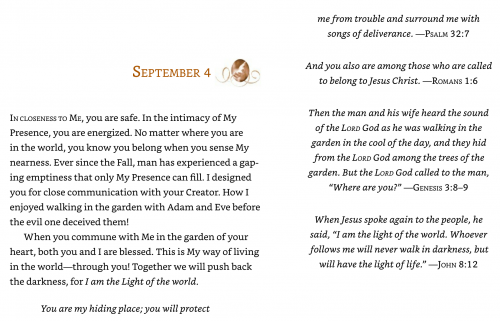True Self/Separate Self
Trusting
a Deeper Aliveness
Friday, September 4,
2020
I believe a regular practice of Centering Prayer is one of the most effective tools we have for discovering our True Selves. Sitting in silence, we become adept at compassionately observing our separate self at work, as it tries to maintain control of the inner narrative. Ultimately, however, with our genuine intention and attention, our True Self is revealed, present to the Presence of God. CAC faculty member Cynthia Bourgeault describes how this happens:
When we enter [into] meditation [or contemplative prayer], it is like a “mini-death,” at least from the perspective of the ego. . . . We let go of our self-talk, our interior dialogue, our fears, wants, needs, preferences, daydreams, and fantasies. . . . We simply entrust ourselves to a deeper aliveness, gently pulling the plug on that tendency of the mind to want to check in with itself all the time. In this sense, meditation is a mini-rehearsal for the hour of our own death, in which the same thing will happen. There comes a moment when the ego is no longer able to hold us together, and our identity is cast to the mercy of Being itself. This is the existential experience of “losing one’s life.”. . .
Just as in meditation [and contemplative prayer] we participate in the death of Christ, we also participate in his resurrection. . . . For twenty minutes we
[i.e., our ego or separate self]
have not been holding ourselves in life, and yet life remains. Something has held us and carried us. And this same something, we gradually come to trust, will hold and carry us at the hour of our death. To know this—really know this—is the beginning of resurrection life. . . .
Virtually all the great spiritual traditions of the world share the conviction that humanity is the victim of a tragic case of mistaken identity. There is a “self” and a Self, and our fatal mistake lies in confusing the two. The egoic self . . . is in virtually every spiritual tradition immediately dispatched to the realm of the illusory, or at best, transitory. It is the imposter who claims to be the whole. This imposter can become a good servant, but it is a dangerous master. Awakening—which in Jesus’ teaching really boils down to the capacity to perceive and act in accordance with the higher laws of the Kingdom of Heaven—is a matter of piercing through the charade of the smaller self to develop a stable connection with the greater Self . . . becoming intimate with our spiritual identity, the sense of selfhood carried in our spiritual awareness. . . .
Through meditation [like Centering Prayer] it gradually becomes ingrained in us that “losing one’s life,” regardless of the action that may ultimately be required of us in the outer world, entails first and foremost a passage from our ordinary awareness to our spiritual one, because only at this deeper level of non-fearbased, wholistic perception will we be able to understand what is actually required of us.
